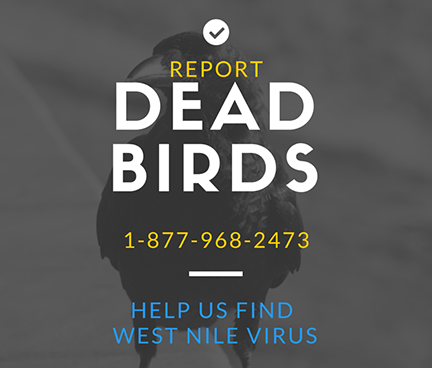August marks the dog days of summer with its long sunny days and warm nights. It’s the perfect time of year for an evening walk.
As you walk around your neighborhood, the Contra Costa Mosquito & Vector Control District (District) would like you to keep an eye open for birds — dead birds in particular because they are often the first sign of West Nile virus (WNV) in a particular area.
How Birds Play a Role In West Nile Virus Transmission
- Certain birds carry WNV.
- Mosquitoes can become infected when they bite an infected bird.
- Mosquitoes can spread the virus when they bite another bird or person.
Some infected birds, particularly crows and jays, can die from WNV. When they do, and someone finds that bird, the District asks residents to report dead birds to the California West Nile virus and Dead Bird Call Center.
“Dead bird reports are very important because when a resident reports a dead bird, the District receives information on the location of the bird. That information is vital in pinpointing where the District needs to focus efforts to reduce the risk of WNV, ” said the District’s Scientific Program Manager Steve Schutz, Ph.D.
So, the next time you find a dead bird while on your evening walk, or on your own property, please report the dead bird by phone at 877-WNV-BIRD (877-968-2473) or https://www.westnile.ca.gov. Operators take reports over the phone from 8:00 a.m. to 4:30 p.m., Monday through Friday. Online reports can be submitted at any time.
Information released by Contra Costa Mosquito & Vector Control District

